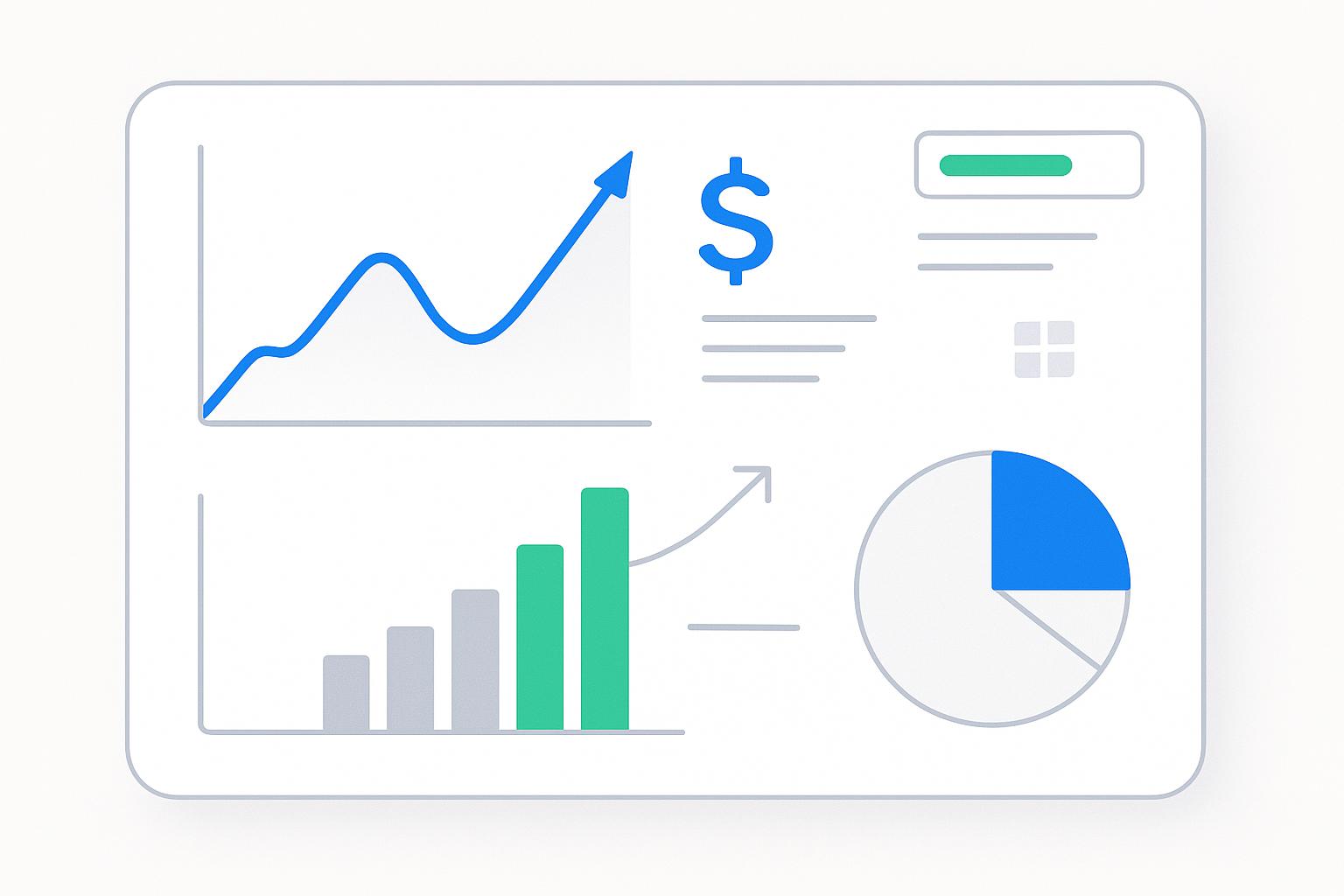Startups are leveraging AI to manage resources more effectively, saving time, cutting costs, and improving decision-making. Here's how AI is transforming how startups handle finances, operations, and growth:
- Predictive Analytics: AI forecasts trends, predicts cash flow needs, and identifies risks early, helping startups plan ahead.
- Automation: Repetitive tasks like bookkeeping, invoice processing, and scheduling are automated, freeing up teams to focus on growth.
- Real-Time Insights: Live data allows startups to make quick adjustments, whether reallocating budgets or addressing cash flow issues.
- Cost Savings: AI reduces errors, avoids unnecessary expenses, and helps startups use funds more efficiently.
- Scalability: As startups grow, AI handles increasing complexity without requiring proportional increases in resources.
For example, tools like Lucid Financials integrate AI with human oversight to provide real-time financial insights, automate bookkeeping, and streamline tax management - all starting at $150/month. Startups no longer need large teams or expensive consultants to manage finances.
AI is reshaping how startups operate, enabling smarter, faster, and more efficient resource management. The question is: Are you ready to take advantage of it?
Product Strategy in the Age of AI: Startups, Speed & Solopreneurs | VIGS Podcast with Adrian Pica
How Does AI Enable Better Resource Management for Startups?
AI equips startups with tools like predictive analytics, automation, and real-time decision-making, helping them streamline operations and adapt quickly to market changes.
What Is Predictive Analytics and Why Is It Important?
Predictive analytics leverages historical data and machine learning to forecast future trends. For startups, this means anticipating needs before they become pressing, which can be a game-changer for staying ahead of potential challenges.
Take financial management, for example. Predictive analytics can uncover seasonal trends, predict when additional funding might be necessary, or identify customers at risk of leaving. With this knowledge, startups can take proactive steps - such as securing a line of credit in advance or reallocating marketing budgets to retain high-value customers.
The technology works by identifying patterns in existing data. For instance, a SaaS startup might notice that customer acquisition costs rise in Q4 due to increased competition. Predictive analytics can flag this trend, allowing the business to adjust its budgeting and marketing strategies to navigate this period more effectively.
Another key area is demand forecasting. E-commerce startups, for example, can use predictive analytics to estimate inventory needs based on seasonal trends, marketing efforts, and broader economic conditions. This helps avoid costly mistakes like running out of stock or overinvesting in inventory that ties up valuable resources.
How Does Automation Simplify Operations?
Automation takes over repetitive, time-consuming tasks, freeing up startup teams to focus on strategic initiatives that drive growth. By handling routine operations, AI allows founders and employees to dedicate more energy to innovation and scaling.
Financial tasks are a prime example of where automation can shine. AI can handle expense categorization, invoice processing, and bank reconciliation. Instead of spending hours manually updating spreadsheets, teams can use that time for product development, customer acquisition, or investor relations.
For startups managing complex transactions or multiple revenue streams, automating data entry is a game-changer. AI can extract details from receipts, invoices, and bank statements, categorizing them automatically. This reduces errors from manual entry and ensures financial records are always up-to-date.
Automation also improves scheduling and resource allocation. AI can assign tasks based on team availability and skills, coordinate meetings across time zones, or allocate computing resources based on demand. These efficiencies not only save time but also enhance operational reliability and data accuracy.
While automation handles the repetitive, real-time decision-making ensures startups can act quickly when it matters most.
What Role Does Real-Time Decision-Making Play?
Real-time decision-making gives startups the agility to respond immediately to changes. Instead of relying on outdated reports, founders can access live data and adjust their strategies on the fly.
Take cash flow monitoring. Traditional accounting might show last month's financials, but AI-powered tools provide a live view of current cash levels, pending payments, and projected balances. If a major payment is delayed or an unexpected expense arises, founders can act immediately to address the issue.
The same applies to marketing. If a campaign isn't performing well, real-time analytics can flag the problem within hours. Startups can then pause the campaign, reallocate budgets to more effective channels, or tweak messaging - avoiding wasted spend.
Real-time insights also allow for dynamic resource reallocation. If one product line suddenly sees a spike in demand while another slows down, startups can quickly adjust inventory, staffing, or marketing efforts. This ability to pivot is crucial for maximizing resources and seizing new opportunities in a competitive environment.
In today's fast-moving business world, the ability to make quick, informed decisions gives startups a critical advantage. AI not only simplifies operations but also empowers startups to act with precision and confidence.
What Are the Main Benefits of AI-Powered Resource Management for Startups?
AI-powered resource management offers startups better financial oversight, cost savings, and the ability to scale efficiently. These advantages tackle some of the biggest hurdles startups face: limited budgets, scarce resources, and the pressure to grow quickly without overspending.
How Does AI Improve Financial Clarity?
AI brings clarity to finances by offering real-time insights into cash flow, expenses, and overall financial health. This allows startup founders to make decisions with confidence, backed by up-to-date data.
Traditional accounting often leaves startups in the dark, relying on monthly reports that arrive too late to address pressing issues. Manual bookkeeping can also lead to incomplete or outdated financial records. AI flips the script by processing transactions instantly and generating real-time financial reports.
Take Lucid Financials, for example. This platform delivers accurate financial records in just seven days and provides live, investor-ready reporting. It even integrates with tools like Slack, enabling founders to ask questions like, “What’s our current runway?” or “How much did we spend on marketing last month?” and receive immediate answers. This kind of instant access to financial data helps startups catch potential cash flow problems early, recognize spending trends, and make informed decisions about hiring, marketing, or product development.
The real-time investor reporting feature is especially helpful during fundraising, showcasing the financial discipline that investors value.
AI also improves accuracy by removing the risk of human error in data entry. Automated categorization of transactions and bank reconciliations ensure financial records stay up-to-date and reliable, giving founders peace of mind. This accuracy lays the groundwork for better operational efficiency and smarter cost management.
Can AI Reduce Costs and Boost Efficiency?
AI doesn’t just clarify finances - it also cuts costs by automating repetitive tasks. These savings go beyond reducing expenses; they help startups make better use of their limited resources. By identifying waste, automating labor-intensive processes, and guiding smarter spending, AI ensures every dollar is used wisely.
One of the biggest benefits is labor savings. Tasks like expense categorization, invoice processing, and financial reporting - which once consumed hours of manual effort - are now handled automatically. For instance, a startup spending 20 hours a week on bookkeeping can redirect that time toward growth-focused activities like product development or customer acquisition.
Automated expense tracking is another game-changer. AI can flag unusual spending patterns, duplicate payments, or expenses that fall outside budget categories. For example, if marketing costs suddenly spike, AI can alert the team immediately, preventing unnecessary overspending from going unnoticed.
AI also streamlines cash flow management by predicting when payments will arrive and when bills are due. This helps startups avoid overdraft fees, missed payment discounts, or other costly mistakes. Some businesses save thousands of dollars annually just by better timing their payments and collections.
Another area where AI shines is procurement management. By analyzing vendor spending patterns, AI can identify opportunities for bulk purchasing and flag upcoming contract renewals. This allows startups to negotiate better deals and avoid automatic renewals at higher rates.
Even in tax management, AI tools like Lucid Financials help startups uncover R&D tax credits, which are often overlooked. These credits can provide much-needed funds, giving startups extra capital to fuel their growth.
How Does AI Support Scalability and Growth?
Once financial clarity and cost control are in place, startups need tools that help them scale efficiently. AI provides the forecasting and scenario modeling capabilities that growing businesses rely on for smart expansion.
Predictive financial modeling is a key feature. Instead of relying on static budgets that quickly become outdated, AI creates dynamic forecasts that adjust as new data comes in. Founders can explore scenarios like, “What happens to our runway if we hire five engineers?” or “How will a 50% increase in customer acquisition affect cash flow?”
AI also makes hiring and workforce planning more strategic. By analyzing current productivity and growth targets, the technology can recommend when to hire and how many people are needed. This helps avoid both understaffing, which can slow progress, and overhiring, which can drain resources.
For startups expanding into new markets or creating subsidiaries, AI simplifies multi-entity management. Platforms like Lucid Financials handle complex corporate structures seamlessly, ensuring compliance across regions while keeping reporting consolidated for investors and leadership teams.
As startups scale, cash flow forecasting becomes even more critical. AI can predict seasonal fluctuations, account for longer sales cycles with enterprise clients, and model how different pricing strategies impact cash flow. This insight helps businesses avoid cash shortages that could derail growth.
Perhaps most importantly, AI-powered systems grow alongside the business. The always-on monitoring adapts to increasing complexity, providing more advanced insights as the company evolves. And unlike traditional systems, AI handles this growth without requiring a proportional increase in costs. A startup can scale from $1 million to $10 million in revenue without needing to build out an entire accounting department, as AI manages the added transaction volume and complexity automatically.
What Tools and Platforms Support AI-Driven Resource Management?
AI-powered tools have the potential to reshape how startups manage their resources. The key lies in selecting platforms that not only address specific tasks - like tracking expenses or managing projects - but also offer an integrated system that evolves alongside your business.
What Makes Lucid Financials Different?

Lucid Financials sets itself apart as the first AI-powered, full-stack accounting firm tailored for startups. Unlike traditional accounting software that relies heavily on manual inputs and static reports, Lucid integrates bookkeeping, tax services, tax credits, and CFO support into one seamless platform.
Its standout feature? Slack integration and real-time investor-ready reporting. Instead of logging into multiple dashboards or waiting for monthly updates, founders can simply ask, “What’s our current burn rate?” in Slack and get instant, accurate answers. Plus, board-ready reports are generated with just one click.
Lucid also excels in handling multi-entity setups and complex founder tax scenarios. As startups grow - whether by forming subsidiaries or expanding internationally - the platform manages these intricate structures automatically while keeping reports consolidated. On top of that, Lucid identifies often-overlooked R&D tax credit opportunities, potentially unlocking thousands of dollars in funding.
The pricing is straightforward and tailored for startups, with flat rates starting at $150 per month for services like bookkeeping, tax, and CFO/fundraising support. This predictable cost structure eliminates the stress of hourly fees or hidden charges, making it easier for startups to plan their budgets.
What truly sets Lucid apart is its hybrid approach: while AI powers the platform’s speed and efficiency, human experts review every output to ensure accuracy and compliance. This combination offers startups the best of both worlds - automated insights backed by professional oversight.
Beyond Lucid Financials, startups can enhance their resource management with specialized tools that integrate effortlessly into AI-driven systems.
What Other Tools Work Well with Resource Management?
While platforms like Lucid Financials focus on financial resource management, startups often see additional benefits from using complementary tools that integrate seamlessly with AI systems. The goal is to avoid isolated data silos and instead create a connected ecosystem.
- Project management and CRM platforms: Tools with API integrations can share valuable data for cost allocation and revenue forecasting. When time-tracking and sales pipeline data flow into AI financial systems, they enable more accurate predictions for resource needs and revenue timing.
- HR and payroll platforms: Integrating these with financial systems allows for smarter workforce planning. AI can analyze hiring costs, compensation, and productivity metrics to recommend the best strategies for team expansion, helping startups avoid overstaffing or resource strain.
- Expense management tools: These tools can automatically categorize and route expenses into accounting systems, reducing manual entry and improving accuracy. When paired with AI financial platforms, they enable real-time tracking and automated budget alerts, keeping costs under control.
The most effective strategy is to use a robust AI financial platform as the central hub while connecting it to specialized tools. This setup allows AI to analyze data from multiple sources, delivering better insights and recommendations. The key is ensuring all tools communicate effectively, eliminating the need for manual data transfers and ensuring a smooth, connected workflow.
sbb-itb-17e8ec9
How Can Startups Overcome Challenges When Adopting AI?
AI has the potential to revolutionize resource management for startups, but many hesitate to embrace it due to competing priorities. The good news? Most of the challenges startups face have practical solutions. By addressing these head-on, startups can tap into AI's benefits without unnecessary roadblocks.
What Are the Main Barriers to AI Adoption?
Startups often encounter a handful of common obstacles when considering AI adoption:
- Data quality and organization: Many founders believe their financial records need to be flawless before using AI tools. While messy or inconsistent records can pose challenges, they also offer an opportunity to improve processes with the right systems in place.
- Integration complexity: Connecting AI tools to existing systems can feel overwhelming, especially for non-technical founders juggling multiple responsibilities. The fear of disrupting daily operations often adds to this hesitation.
- Cost concerns: Tight budgets make some founders wary of AI, assuming it requires hefty upfront investments or unpredictable costs. Transparent, budget-friendly solutions can address these worries.
- Learning curve: Teams may be reluctant to adopt new tools, fearing the initial adjustment period could disrupt workflows - even if those workflows aren’t ideal to begin with.
- Trust and control: Delegating critical decisions to AI can feel risky, especially when the technology’s processes aren’t entirely clear. This lack of transparency can make leaders hesitant to fully embrace automation.
Addressing these challenges requires tools that simplify adoption, integrate smoothly, and build trust through a balance of automation and human oversight.
How Can Startups Get the Most Value from AI?
To make AI work for them, startups should focus on solutions that are ready to use and easy to integrate. Here’s how they can maximize value:
- Start with a solid financial foundation: Platforms like Lucid Financials streamline onboarding by organizing your financial data within a week. This gives startups a clean slate while the AI begins learning patterns specific to their business.
- Adopt a human-AI hybrid model: The best results come from combining AI’s efficiency with human expertise. When professionals validate AI-generated insights, you get accurate information while maintaining control.
- Choose integration-friendly tools: For example, using AI tools that work within familiar platforms like Slack ensures your team can access insights without disrupting existing workflows.
- Opt for transparent pricing: Look for solutions with clear, predictable monthly costs. This approach helps startups manage expenses without unexpected surprises.
- Take it step by step: Instead of diving in all at once, start with core areas like financial management. Expand gradually as you see measurable results, building confidence while minimizing risk.
- Track progress from day one: Set clear metrics to measure time savings, data accuracy, and decision-making improvements. This helps demonstrate AI’s value and identifies areas for further refinement.
Ultimately, startups don’t need perfect data or technical expertise to succeed with AI. By choosing solutions tailored to their needs and supported by expert guidance, they can overcome challenges and unlock AI’s potential for smarter resource management.
Conclusion: The Future of Resource Management for Startups
Startups aiming to grow and stay competitive in today’s fast-paced environment need to embrace AI-powered resource management. Those who adopt these tools early will have a clear edge over competitors relying on manual processes and reactive strategies.
With proactive resource management, startups can identify potential challenges early, adjust spending in real time, and drive growth using data-driven decisions. Founders no longer have to scramble for accurate financial insights during critical moments like fundraising or budget planning. Instead, they gain instant access to reliable, up-to-date information whenever they need it.
This shift breaks down traditional barriers, giving even small teams the kind of financial visibility that was once reserved for large enterprises. There’s no longer a need for hefty accounting departments or costly consultants to handle forecasting, reporting, and analysis. AI handles the complex, repetitive work, while human experts step in with strategic direction. This combination of automation and expertise allows startups to operate with precision and confidence.
For instance, tools like Lucid Financials are leading the charge by blending AI automation with expert oversight. With features like clean books in just seven days and instant updates via Slack, Lucid Financials integrates seamlessly into existing workflows, delivering immediate value and making financial management effortless.
Startups that can adapt quickly and efficiently will thrive, and AI-powered tools are the key to making that happen. By automating repetitive tasks, offering predictive insights, and keeping financial data current, these tools free founders to concentrate on what matters most: building exceptional products and scaling their businesses.
The real question is: Will your startup take the leap and gain the upper hand, or risk falling behind? The choice is yours.
FAQs
How can startups organize their data to effectively use AI for resource management?
To make the most of AI in resource management, startups need clean, well-structured data. Start by creating clear rules around data governance - this includes defining who owns the data and scheduling regular quality checks. Automating repetitive tasks like cleaning up data and standardizing formats can go a long way in keeping things accurate and consistent.
It’s also important to regularly validate your data and fix any errors right away. This helps ensure that the insights generated by AI remain trustworthy. With reliable, high-quality data as a foundation, startups can leverage AI to make smarter, more efficient decisions about resource management.
How can startups integrate AI tools into their existing systems without disrupting daily operations?
How Startups Can Integrate AI Tools Effectively
To make the most of AI tools, startups should begin by pinpointing the specific areas in their operations where AI can make a noticeable impact. Look for tools that are flexible and work well with your existing systems - especially those designed to integrate with cloud platforms and APIs without a hitch.
Data preparation is another critical step. AI thrives on clean, organized data, so take the time to ensure your data is in top shape. It's also a good idea to bring cross-functional teams into the process early on. This helps align goals across departments and tackle any challenges before they escalate.
When it’s time to implement, take things slow. Roll out AI tools in phases, starting with small pilot tests. This phased approach not only reduces the risk of disruptions but also allows you to fine-tune the system before scaling up. By taking these steps, your business can unlock the full potential of AI while keeping operations running smoothly.
How does combining AI automation with human expertise benefit startups, and how does this approach work in practice?
The human-AI hybrid model combines the efficiency of AI for handling repetitive, time-consuming tasks with the strategic and creative strengths of human expertise. For instance, AI can take care of things like data analysis, bookkeeping, or customer support, freeing up humans to concentrate on innovation, leadership, and tackling complex problems.
This partnership helps startups grow more efficiently by boosting productivity, cutting costs, and delivering better results. By automating everyday tasks, teams and founders can shift their focus to activities that drive growth, making smarter use of resources while enhancing the customer experience.
Take Lucid Financials, for example - a platform designed with startups in mind. It merges intelligent AI tools with professional support, helping businesses simplify operations, stay prepared for investors, and stay focused on achieving their core objectives.


